 October 2023 in “Arab Gulf journal of scientific research”
October 2023 in “Arab Gulf journal of scientific research” The powder shampoo with cinnamon extract has strong antioxidant properties and is eco-friendly.
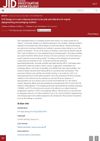 November 2022 in “Journal of Investigative Dermatology”
November 2022 in “Journal of Investigative Dermatology” A new molecule was found to be a safe and effective skin lightener and anti-aging product.
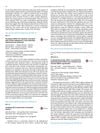 September 2016 in “Journal of Dermatological Science”
September 2016 in “Journal of Dermatological Science” Golden oyster mushroom extract may protect skin cells from aging by its antioxidant properties.
The best way to apply vitamin C to the skin is with a nanostructured lipid carrier formulation.
 January 2023 in “Discovery medicine”
January 2023 in “Discovery medicine” Cepharanthine helps reduce cell aging caused by the cancer drug Doxorubicin by boosting cell cleanup processes.
 7 citations,
July 2018 in “Biological & Pharmaceutical Bulletin”
7 citations,
July 2018 in “Biological & Pharmaceutical Bulletin” Phyllanthus urinaria extract may help treat hair loss by blocking a hair-related enzyme.
4 citations,
January 2010 in “Elsevier eBooks” Natural ingredients are seen as safe and effective in cosmetics, and plant tissue culture is becoming key for ingredient supply.
 September 2016 in “Journal of Dermatological Science”
September 2016 in “Journal of Dermatological Science” The protein aPKCλ is crucial for keeping hair follicle stem cells inactive and for hair growth and regeneration.
4 citations,
August 2018 in “Journal of cellular biochemistry” Acid inside cells speeds up aging and turns on aging signs in mice.
1 citations,
September 2019 in “Journal of cosmetic dermatology” Lead and selenium levels don't cause premature graying.
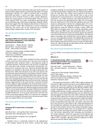 September 2016 in “Journal of Dermatological Science”
September 2016 in “Journal of Dermatological Science” A specific mutation known for causing cancer is also found to cause a skin condition in a young girl.
Heated radish extract may help lighten skin and reduce aging signs.
 13 citations,
February 1999 in “International Journal of Cosmetic Science”
13 citations,
February 1999 in “International Journal of Cosmetic Science” Hair loss increases between July and October, possibly due to UV light, and factors like skin type, hair color, and density may affect this. Dandruff can worsen hair loss conditions.
 19 citations,
July 2018 in “Mechanisms of Ageing and Development”
19 citations,
July 2018 in “Mechanisms of Ageing and Development” Eating less can slow aging and help keep stem cells healthy by cleaning out damaged cell parts.
 23 citations,
March 2019 in “Journal of Essential Oil Research”
23 citations,
March 2019 in “Journal of Essential Oil Research” Rosemary's antioxidant content changes with the climate and season.
 December 2022 in “Geriatrics”
December 2022 in “Geriatrics” Good communication helps predict successful aging in older Indonesians.
 September 2016 in “Journal of Dermatological Science”
September 2016 in “Journal of Dermatological Science” A gene mutation worsens skin irritation in mice due to a lack of certain fats.
Quercetin can help heal wounds better if its skin absorption is improved.
 12 citations,
June 2021 in “Scientific Reports”
12 citations,
June 2021 in “Scientific Reports” Curcumin may help reverse aging by targeting specific genes.
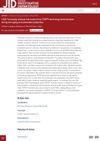 April 2023 in “Journal of Investigative Dermatology”
April 2023 in “Journal of Investigative Dermatology” Terminalia chebula fruit extract has strong anti-aging and antioxidant effects.
 December 2023 in “Medicine and Materials”
December 2023 in “Medicine and Materials” Essential oils are increasingly used in cosmetics for their natural benefits but must be used carefully to avoid skin reactions.
May 2024 in “International journal of molecular sciences” Melatonin cream may help prevent skin damage but its anti-aging and hair growth effects are unclear.

Regenerative cosmetics can improve skin and hair by reducing wrinkles, healing wounds, and promoting hair growth.
September 2022 in “The Korean Tea Society” Houttuynia cordata compounds may help with anti-aging and hair loss.
 3 citations,
January 2023 in “International Journal of Cosmetic Science”
3 citations,
January 2023 in “International Journal of Cosmetic Science” Coffee and its by-products are promising for skin health benefits in cosmetics and help reduce environmental impact.
2 citations,
April 2011 in “InTech eBooks” Non-denatured soybean extracts provide multiple anti-aging skin benefits.
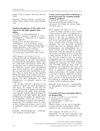 5 citations,
February 2009 in “International Journal of Cosmetic Science”
5 citations,
February 2009 in “International Journal of Cosmetic Science” Coenzyme Q10 helps reduce aging in human hair.
 January 2024 in “Elsevier eBooks”
January 2024 in “Elsevier eBooks” Plant biomass materials are effective and eco-friendly for skin and hair care in cosmetics.
2 citations,
October 2008 in “InTech eBooks” Non-denatured soybean extracts are effective for skin care, offering skin lightening, anti-aging, and UV protection benefits.
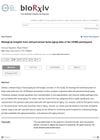 2 citations,
September 2019 in “bioRxiv (Cold Spring Harbor Laboratory)”
2 citations,
September 2019 in “bioRxiv (Cold Spring Harbor Laboratory)” Self-perceived facial aging is linked to skin pigmentation, immune system, hair loss in men, and genes related to the skin's structure.




















